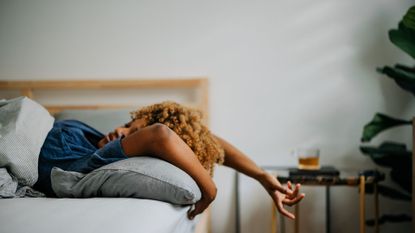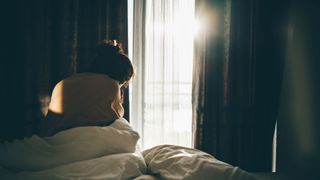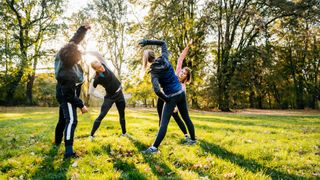How to sleep better - 13 simple changes to make for easier rest, revealed by the experts
Practical advice on how to sleep better, from reducing symptoms of menopause to changing your daily routine, revealed by sleep doctors and scientists


If you've noticed a change in your sleep lately, it may be time to learn how to sleep better and reconsider your nighttime habits. Whether it's the changes that come with age or problems with your bedtime routine, there are so many things that can get in the way of healthy sleep.
It's recommended that every adult aims for at least eight hours every night - but how much sleep we need is different for everyone. Some of us need more sleep based on age, daily activity levels, and other lifestyle factors, while others need less. What's clear from the research, however, is that we're all sleeping much worse than we used to.
According to Nuffield Health's most recent 'Healthier Nation Index', our sleep quality and duration have gradually declined in recent years. It's now thought that only 36% of us get between four and six hours of sleep per night, with the average Brit sleeping 5.91 hours.
The good news, however, is that everyone can learn how to sleep better - no matter the life stage or lifestyle. From the best ways to improve your sleep hygiene to expert-approved ways to learn how to fall asleep fast, here, woman&home speaks to certified sleep scientists, doctors, nutritionists, and other health experts to reveal how to change your sleep routine.
How to sleep better
1. Make sure your bedroom is dark enough
Going back to the basics of sleep, most of us will struggle to drift off if we're exposed to light of any kind. As the University of Surrey reveals in research, light is the primary trigger in our body's natural sleep-wake cycle - also known as the circadian rhythm. When our eyes register light, the pineal gland in the brain limits the production of the sleep hormone melatonin. Without melatonin, we struggle to drift off and stay asleep.
The study shows that along with a lower quality of sleep overall, a lack of melatonin will cause issues for your body's temperature regulation system, blood pressure, and blood sugar levels. If you're too hot trying to sleep at night, the light in your bedroom could be a part of the problem.
"I'd suggest blocking out light with black-out blinds, which you can install behind the curtains in your bedroom, or investing in a good sleep mask to cover your eyes," says psychologist Hope Bastine, a sleep consultant. "This will help you maintain a good temperature for sleep as well, but you should also look at lowering your bedroom's temperature too. 18 degrees Celsius or lower is best as it mimics the body's hibernation state and helps us maintain a calmer mind."
Sign up for the woman&home newsletter
Sign up to our free daily email for the latest royal and entertainment news, interesting opinion, expert advice on styling and beauty trends, and no-nonsense guides to the health and wellness questions you want answered.
Hope Bastine is a sleep and trauma psychologist, a Cognitive Behavioural Therapy (CBT) specialist, and the founder of Fresh Perception, a wellbeing company. She is also the sleep psychology consultant for Simba Sleep and leads mindfulness and wellbeing workshops across Europe.

2. Ease disruptive night sweats
Unfortunately, menopause can cause insomnia and night sweats are one of the most common reasons for this. When oestrogen levels start to fall in perimenopause, the part of the brain that deals with changes to body temperature (called the hypothalamus) can struggle to regulate like it once did.
Night sweats - when sudden warmth in the face, neck, and chest is followed by intense sweating that soaks your clothes and bedsheets - is often a side effect of this. Needless to say, it impacts sleep fairly easily.
While there are many treatment options for those dealing with the symptoms of menopause, from cooling mattresses and pillows to preventative options like increased exercise and dietary changes, HRT is considered one of the most effective options.
Speak to your doctor if you're struggling with menopause or perimenopause symptoms and want to discuss hormonal treatment options.
3. Improve your sleep environment
Your bedding can play a big role in your sleep environment too, the experts note. For example, low-quality pillows are also often a reason why many of us feel uncomfortable at night, a study by James Cook University suggests. While mattresses and duvets have a longer life span - you'll only need to change these when they become uncomfortable or start to fall apart - pillows aren't as hard-wearing.
If you are going through menopause and dealing with night sweats, one of the best pillows with a cooling effect may be a better option for you than standard regular or thin pillows.
However, as with anything else when it comes to sleep, it's all personal. Finding a pillow that works well for your sleeping position and firmness preference is essential, says Dr Verena Senn, a neurobiologist working with Emma. "If you don't have a pillow suited to your body, it can lead to stress on the cervical vertebral structures, which are the seven vertebrae that make up your neck."
If you already struggle with discomfort in this area, it's always best to consult your doctor for advice and specifically look for the best pillows for neck pain.
With over 15 years of experience in neuroscience and research, Verena's passion lies in improving the quality of sleep on a global scale. She is the Head of Sleep Research at Emma, a science-backed sleep company.
4. Tweak your diet
Several studies support the idea of eating for better sleep. For example, a large review by Mayo Clinic Jacksonville found that those who had more fibre in their diet experienced a better quality of sleep, with positive correlations found between fibre intake and time spent in slow-wave sleep, which is beneficial for consolidating memories, maintaining a healthy immune system, and generally waking up feeling refreshed.
Similarly, those who mostly followed a plant-based diet were found to have slept better than those who didn't in research by the University of Texas, as plants like bananas and grapes are primary sources of melatonin - that all-important sleep hormone.
However, other research by the University of Pennsylvania found that diets high in fat are likely to disrupt some bodily processes that work to signal that it's time for sleep, making it harder to come by.

Fruits and vegetables are rich in fibre, one of the macronutrients proven to help improve sleep.
5. Put down all technology
You might have heard all about how blue light affects sleep. The light emitted from phones, laptops, televisions, and all other screened devices replicates the effect of natural light on the body's circadian rhythm and prevents melatonin release, signalling to the body that it's time to wake up.
But looking at your phone distracts the brain from sleep in other ways too, explains Dr Senn. "Social interactions and watching stimulating TV programs keep your brain busy when it's craving to relax," she says.
Instead of reaching for your phone to unwind, Dr Senn suggests listening to a playlist of white, brown, or pink noise, or reading a book. "Choose a physical copy over an e-reader to avoid any potential problems here. You could also listen to music, a relaxing podcast, or have a bath an hour before bed."
6. Try meditation
Tossing and turning in the middle of the night? Start your bedtime routine with some meditation or some manifestation before sleep, suggests Bastine, who works with Simba. "Meditation calms the body and the mind as it kickstarts the parasympathetic nervous system, which is responsible for the body's rest and digest functions," she explains. "When this happens, a specific type of rest called restorative sleep occurs as our sympathetic [aka flight or fight] system's function is no longer the more prominent one."
In turn, this can help to lower your cortisol levels, a study from Srinakharinwirot University shows. Cortisol is the body's primary stress hormone and it has many negative side effects at high levels, including a negative impact on sleep.
Meditation doesn't have to be a lengthy process - it can help you fall asleep in three minutes and be as simple as doing a few breathing techniques for stress relief. Peer-reviewed research from Arizona State University backed by the meditation app Calm found that over 85% of participants who meditated for just 10 minutes before trying to doze off reported better and longer sleep.
If you want to give it a try, opt for a sleep-guided meditation or a yoga nidra breathing exercise, both of which focus specifically on stimulating the body's parasympathetic nervous system. For the same reasons, bedtime yoga has been proven to help those who struggle to fall asleep at night.

7. Try listening to a soundscape
Mediation isn't for everyone. If you're struggling with the practice, try listening to a soundscape instead. Brown noise is a deep, rumbling sound that falls a couple of frequencies lower than white and pink noise. It often crops up on the best podcasts to fall asleep to as thunderstorms, water rapids, or waves lapping against the shore.
Unlike meditation, listening to soundscapes isn't fully scientifically proven to help you learn how to sleep better, but it can successfully drown out other noises that may cause anxiety before bed. "An individual may have a neuro-association with a specific sound which provokes anxiety," explains Dr Olivia Arezzolo, a psychologist specialising in sleep. "Playing a different sound, such as brown noise in the form of a thunderstorm soundscape, will help the individual to sleep better."
Dr Arezzolo has 14 years of professional and academic experience in sleep science - including a Bachelor of Social Science (Psychology), Certificate in Sleep Psychology and a Diploma of Health Science (Nutritional Medicine).
8. Avoid drinking alcohol before you sleep
Those who give up alcohol for good often find their sleep quality drastically improves within a few weeks of their last drink - but you don't have to ditch alcohol completely to feel the benefits of lighter drinking on your sleep routine. Even cutting down on alcohol can make a difference, the experts say.
"Alcohol is a sedative, which may make you think that it would be beneficial for sleep, but this works against us. Those who have been drinking often fall asleep a lot quicker than those who haven't, meaning they slip into a deep sleep very quickly. As the night goes on, this causes an imbalance between two other important types of sleep, slow-wave and REM, with more slow-wave and less REM sleep," says Dr Senn. "It can be why we struggle to remember events after a night out sometimes too, as REM sleep is very important for memory consolidation."
Instead, try ending your day with a tipple designed to lull you to sleep - like one of the many alternatives to alcohol or a natural sleep aid, like tart cherry juice.
9. Take a sleep supplement
While supplements won't be the cure-all for sleep struggles, if they are used right, they can help with relaxation before bed. The most popular supplements for sleep include:
- Magnesium
- Valerian root
- Chamomile
- Passionflower
- Marjoram
Melatonin is another popular one. Being the body's primary sleep hormone, supplementing with additional melatonin can support healthy sleep in those dealing with serious insomnia. However, it's only available on prescription in the UK.
CBD supplements for sleep have also become especially popular in recent years, due to the legalisation of cannabidiol (CBD) and research from the University of Colorado on the extract's ability to target common causes of insomnia such as anxiety, stress, and pain.
Always consult your doctor before taking any sleep supplements or changing your lifestyle significantly to support healthy sleep.

10. Experiment with sleep aids
Sleep supplements are among the best sleep aids but they're by no means the end of the story. If sleep supplements aren’t for you, there are alternatives you can incorporate into your bedtime routine to reduce stress and help you relax.
Many other sleep aids, including sunrise alarm clocks and the best weighted blankets, are designed to improve your sleep environment by conquering some of the most common difficulties we face when learning how to sleep better. The most useful aid for you will be different for someone else though, so determine the biggest problem and then figure out a solution.
This could be something as simple as wearing thicker socks. A study by Seoul National University found that wearing socks to bed helped participants not only fall asleep faster but also stay asleep for longer. Other popular sleep aids include pillows specially designed to alleviate pressure on the neck as noted, sleep masks to block out light, and calming sprays to spritz onto your pillow at night.
11. Cut down on your caffeine intake
Caffeine may be the answer to a bad night's sleep but too much can impact our ability to nod off at night, creating a vicious cycle of sleep deprivation and caffeine.
"Caffeine increases vigilance and mental performance but the most common side effect of caffeine is blocking processes in the brain that allow the body to sense tiredness, making it harder to fall asleep," explains Dr Senn.
To combat the effects and learn how to sleep better, she suggests, "Aim to drink no more than two or three caffeinated beverages per day and switch to herbal or decaf alternatives after midday. If you can't resist a warm drink in the evening or after dinner at a restaurant, try a sleep tea instead."
12. Exercise and stay active daily
Longstanding research suggests that exercise a couple of hours before bedtime is one of the biggest contributors to a good night's sleep - particularly for those who struggle with insomnia.
Research from Universidade Federal de São Paulo even suggests that working out before bed promotes better sleep than many popular types of sleep medication. They also found that those who exercised fell asleep in half the time of those who didn’t, and wakefulness throughout the night in the group decreased by 30% with total sleep time up by almost 20%.
That being said, the type of exercise you do is important. Dr Guy Meadows, a sleep scientist and the founder of Sleep School, says: "It's best to avoid HIIT workouts too late at night. Instead, opt for slow and restorative practices like yoga or LISS cardio later in the evening to kickstart the body's 'rest and digest' systems. And even then, you should still leave at least two hours between your session and going to sleep, to allow your core body temperature to cool."
Exercising too close to bedtime can have the opposite effect and keep you awake for longer.
Dr Guy Meadows is a sleep psychologist, author, and the co-founder and clinical director at Sleep School. He is a leading figure in the area of chronic insomnia and a pioneer in the use of Acceptance and Commitment Therapy (ACT) and Mindfulness treatment to treat sleep issues.
13. Write in a journal every day
Stress from the day can build up and keep us awake at night so it's important to try and dissolve this before you go to sleep. "As we get older, we have more mental and physical baggage so our thinking mind can sometimes keep us awake at night," Dr Meadows explains. “The organic compound adenosine, which helps us to naturally fall asleep, isn’t as present as we grow older so we're more likely to be wide awake and worry about work or personal stresses.”
Journaling is one of the more successful ways to lower your stress levels before bed as can help develop an awareness of where the stress comes from, cutting it off at the source. "Labeling what type of stress it is-work, relationship, or something else is a great way of telling your brain that you know the stress exists, but it's something you're not able to deal with right now," he says. It can even help you learn how to recover from burnout if chronic stress and burnout from work is a problem preventing you from getting to sleep.

Grace Walsh is woman&home's Health Channel Editor, working across the areas of fitness, nutrition, sleep, mental health, relationships, and sex. She is also a qualified fitness instructor. In 2024, she will be taking on her second marathon in Rome, cycling from Manchester to London (350km) for charity, and qualifying as a certified personal trainer and nutrition coach.
A digital journalist with over six years experience as a writer and editor for UK publications, Grace has covered (almost) everything in the world of health and wellbeing with bylines in Cosmopolitan, Red, The i Paper, GoodtoKnow, and more.
-
 Ageing expert reveals 4 tips to 'build better bone' on Davina McCall's new podcast - and why it's so important
Ageing expert reveals 4 tips to 'build better bone' on Davina McCall's new podcast - and why it's so importantDr Vonda Wright is a leading surgeon, scientist, and researcher on longevity and mobility
By Grace Walsh Published
-
 Zara Tindall’s olive green Christmas coat proves why we should never underestimate the style power of outerwear
Zara Tindall’s olive green Christmas coat proves why we should never underestimate the style power of outerwearZara Tindall's 2023 Christmas Day outfit was unbelievably elegant and it reminded us how key coats are to winter styling
By Emma Shacklock Published